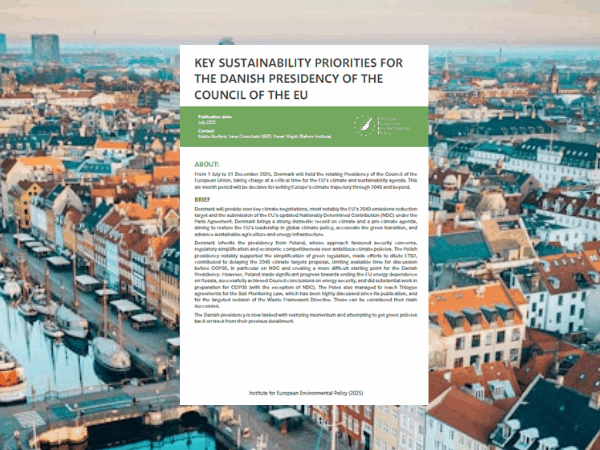AUTHORS: Mattia Bonfanti, Irene Chiocchetti and Amalia Tuchmann (IEEP), and Paweł Wiejski (Reform Institute)
From 1 July to 31 December 2025, Denmark will hold the rotating Presidency of the Council of the European Union, taking charge at a critical time for the EU’s climate and sustainability agenda. This six-month period will be decisive for setting Europe’s climate trajectory through 2040 and beyond.
Denmark will preside over key climate negotiations, most notably the EU’s 2040 emissions reduction target and the submission of the EU’s updated Nationally Determined Contribution (NDC) under the Paris Agreement. Denmark brings a strong domestic record on climate and a pro-climate agenda, aiming to restore the EU’s leadership in global climate policy, accelerate the green transition, and advance sustainable agriculture and energy infrastructure.
Denmark inherits the presidency from Poland, whose approach favoured security concerns, regulatory simplification and economic competitiveness over ambitious climate policies. The Polish presidency notably supported the simplification of green regulation, made efforts to dilute ETS2, contributed to delaying the 2040 climate targets proposal, limiting available time for discussion before COP30, in particular on NDC and creating a more difficult starting point for the Danish Presidency. However, Poland made significant progress towards ending the EU energy dependence on Russia, successfully achieved Council conclusions on energy security, and did substantial work in preparation for COP30 (with the exception of NDC). The Poles also managed to reach Trilogue agreements for the Soil Monitoring Law, which has been highly discussed since its publication, and for the targeted revision of the Waste Framework Directive. These can be considered their main successes.
The Danish presidency is now tasked with restoring momentum and attempting to get green policies back on track from their previous derailment.
This analysis is the result of a discussion and presentation convened on 30 June 2025 as part of the Think Sustainable Europe network’s ongoing efforts to connect environmental think tank voices and policy experts with the European Council Presidencies’ priorities. Organised jointly with CONCITO (Denmark) and the Reform Institute (Poland), the meeting provided a forum for cross-border learning, enabling participants to exchange lessons from the Polish Presidency and anticipate opportunities and challenges for the incoming Danish Presidency. By sharing strategies and experiences, the TSE network aims to strengthen engagement, improve policy coordination, and build capacity for shaping environmental priorities across the EU. Find out more about Think Sustainable Europe.

